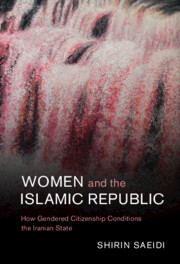Book contents
- Women and the Islamic Republic
- Cambridge Middle East Studies
- Women and the Islamic Republic
- Copyright page
- Dedication
- Epigraph
- Contents
- Acknowledgments
- 1 State Formation and Citizenship
- 2 Reflecting on an Idealized Past
- 3 Revolutionary Citizens
- 4 The Body in Isolation
- 5 The Aftermath of War
- 6 Iran’s Hezbollah and Citizenship Politics
- 7 Conclusion
- Bibliography
- Index
- Series page
5 - The Aftermath of War
Wives and Daughters of Martyrs and the Post-1988 State1
Published online by Cambridge University Press: 13 January 2022
- Women and the Islamic Republic
- Cambridge Middle East Studies
- Women and the Islamic Republic
- Copyright page
- Dedication
- Epigraph
- Contents
- Acknowledgments
- 1 State Formation and Citizenship
- 2 Reflecting on an Idealized Past
- 3 Revolutionary Citizens
- 4 The Body in Isolation
- 5 The Aftermath of War
- 6 Iran’s Hezbollah and Citizenship Politics
- 7 Conclusion
- Bibliography
- Index
- Series page
Summary
The legacy of war is a neglected area of research, particularly among political scientists. This chapter thus explores the legacies of violence that occurred during the first decade of the Islamic Republic through case studies of wives and daughters of war martyrs. With a focus on tensions between the tenses, I begin by illustrating how compliance with the post-revolutionary state’s political regime can nevertheless engender act of citizenship that challenge state narratives from this inaccessible temporal site where the past and present compete and inspirations arise. Next, the chapter demonstrates how individualised memorialisations of the past are more explicitly and intentionally deployed by wives and daughters to encounter gender and familial cultures today. This section illustrates the state’s transformation through a discussion of how individual memories of the Islamic Republic’s first decade are specifically utilised by women to resist and consequently remake contemporary structures of the family. Interviewees identify personal participation during the revolution and war, and the death of husbands and fathers as central to shaping their contemporary acts of citizenship. These acts bolster their pursuit of autonomy in thought and action, particularly within and through the family.
- Type
- Chapter
- Information
- Women and the Islamic RepublicHow Gendered Citizenship Conditions the Iranian State, pp. 136 - 162Publisher: Cambridge University PressPrint publication year: 2022



